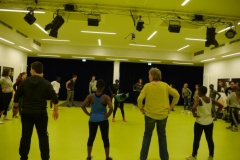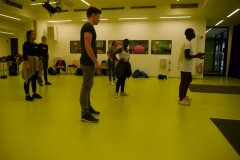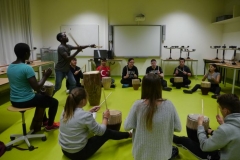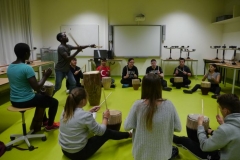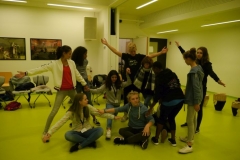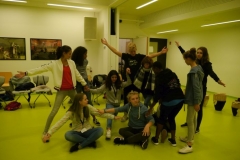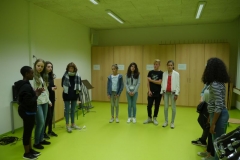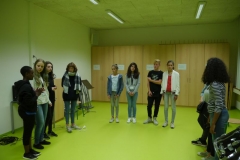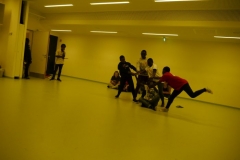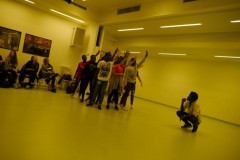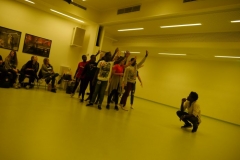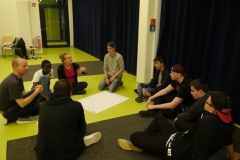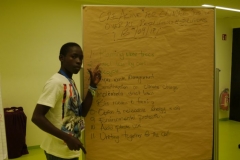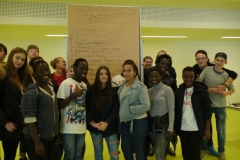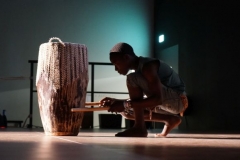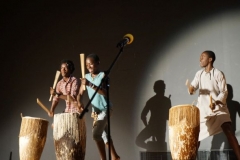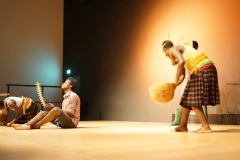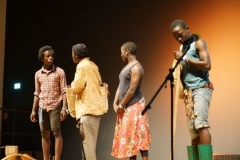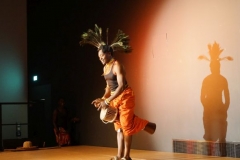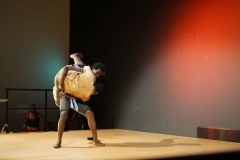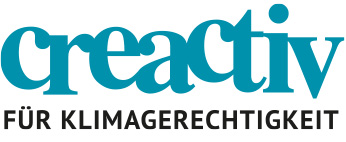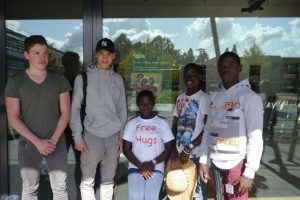 Mit einer beeindruckenden und berührenden Bühnenshow endete am Freitag (15.9.) die Projektwoche mit der Sosolya Ungudu Dance Academy an der Stadtteilschule Bergedorf:
Mit einer beeindruckenden und berührenden Bühnenshow endete am Freitag (15.9.) die Projektwoche mit der Sosolya Ungudu Dance Academy an der Stadtteilschule Bergedorf:
Die Schüler*innen der Klasse 10b hatten die ganze Woche über engagiert und intensiv sowohl zu Themen des globalen Klimawandels gearbeitet als auch Trainings in Tanz, Trommeln und Schauspiel absolviert. Vieles war neu und ungewohnt – besonders die körperliche und kreative Arbeit verlangte den Jugendlichen einiges an Konzentration, Körpereinsatz und auch Überwindung ab. Manch eine*r, der oder die anfangs mit Skepsis und großer Zurückhaltung auf die Begegnungswoche mit SUDA geschaut hatte, musste innere Grenzen überschreiten. Doch es lohnte sich: alle sammelten neue Erfahrungen mit der eigenen Rolle im Gruppenprozess, mit Ausdruck und Präsenz auf der Bühne.
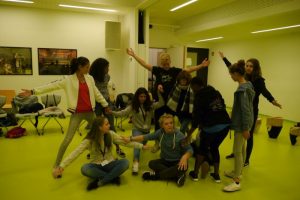 Nach nur wenigen Tagen war aus der heterogenen deutsch-ugandischen Jugendgruppe ein eingeschworenes Team geworden, das aufeinander achtete, sich gegenseitig anspornte und unterstützte und schließlich mit höchstem Einsatz und voller Überzeugung all ihre Kraft in die Abschlusspräsentation legte. Ihre Energie sprang dann auch auf die rund 300 anwesenden Mitschüler*innen und Lehrkräfte über, die den jungen Schaupieler*innen mit stürmischem Applaus dankten. Auch der lokale Sender Hamburg1 war vor Ort und berichtete.
Nach nur wenigen Tagen war aus der heterogenen deutsch-ugandischen Jugendgruppe ein eingeschworenes Team geworden, das aufeinander achtete, sich gegenseitig anspornte und unterstützte und schließlich mit höchstem Einsatz und voller Überzeugung all ihre Kraft in die Abschlusspräsentation legte. Ihre Energie sprang dann auch auf die rund 300 anwesenden Mitschüler*innen und Lehrkräfte über, die den jungen Schaupieler*innen mit stürmischem Applaus dankten. Auch der lokale Sender Hamburg1 war vor Ort und berichtete.
Im Anschluss zogen alle in den Schulgarten, wo gemeinsam ein Apfelbaum gepflanzt wurde – als erster Akt eines gemeinsamen klimafreundlichen Handels und als Symbol der Verbundenheit der Stadtteilschule Bergedorf mit der Sosolya Ungudu Dance Academy im gemeinsamen Einsatz für mehr Klimagerechtigkeit. Nach ihrer Rückkehr nach Kampala wird SUDA für jede*n Schüler*in der Klasse 10b ebenfalls einen Baum pflanzen, der den Namen der/s Schüler*in trägt, dort auf ihren Besuch wartet und sie daran erinnert, dass sie Teil eines globalen Netzwerkes für Climate Justice sind.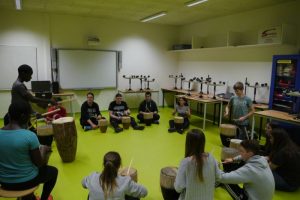
Für die begleitenden Lehrkräfte und uns Projektleiter ist es immer wieder (auch emotional) bewegend und bestärkend mitzuerleben, welche Wirkungen das peer to peer Lernen mit kreativen Methoden bei Jugendliche erzielen kann und zu welchen Leistungen die jungen Menschen fähig sind, wenn man ihnen die entsprechenden Freiräume und Unterstützung gewährt. Quasi spielerisch erwerben sie dabei Kenntnisse über Ursachen und Folgen des Klimawandels, erkennen die Notwendigkeit des eigenen Handelns, entwickeln Ideen, was man tun könnte, und üben eine Haltung sowie Kompetenzen ein, die für die Gestaltung einer nachhaltigen Entwicklung unabdingbar sind: Perspektivenwechsel, Empathie und Solidarität, Teamarbeit, sich selbst und andere motivieren können, das Aushalten von Konflikten und Widersprüchen, vorausschauendes Denken, die Suche nach kreativen Lösungen u.v.m.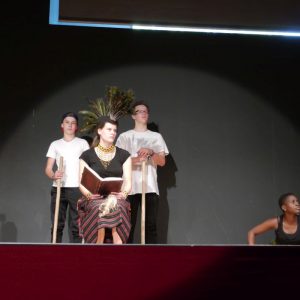
Unser besonderer Dank geht an die professionellen und überaus geduldigen und freundlichen (aber auch mal strengen) jugendlichen Künstler*innen von SUDA sowie an ihren Projektleiter Marc und den Tanzlehrer Denis.
Begleitet und dokumentiert wurde die Projektwoche von Flora Nicholaus aus Dar es Salaam, die uns für ein Jahr bei unserer Arbeit als Volontärin im Rahemn des „weltwärts reverse“-Programms unterstützt. Hier ist ihr Bericht:
The Sosolya Undugu Dance Academy from Kampala / Uganda spent a week at the Stadtteilschule Bergdorf with class 10B to discuss about the climate change problems, ways to combat its effects and get to know each. The programs started from 8:00 a.m. – 4:00 p.m everyday. It started with a warm up and brain changes game like KAPUT, followed by discussions about the play and climate change effects. The students formed three groups: dancing, acting and drumming. Within this groups the students had to use creative methods to express the effects of climate change.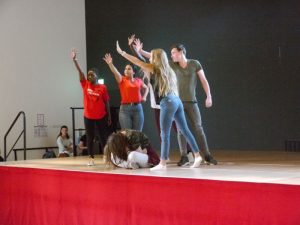
SUDA together with class 10B students learnes and took part in KWAFE KWE KWAFE play whereby the play explained about the part of Uganda known as KAMBA. The region has been effected by the climate change due to cutting down trees, environmental pollution, industrialization and many more other factors.
The KAMBA people shifted from their land to KWAFE land after having experienced climate change effects like droughts, land slide, hunger and floods. They intruded the land of KWAFE people and the KWAFE chief had to allowed them to settle and take parts of KWAFE land. So the intruders could get a place to stay and also industrialize the KWAFE area. Then they started constructing big buildings for their stay and (later on) building big factories for producing yogurt, cheese and milks. During this process the KAMBA people had to cut down trees so that they can get a place to build the houses and factories but then they didn’t replant the trees that were cut.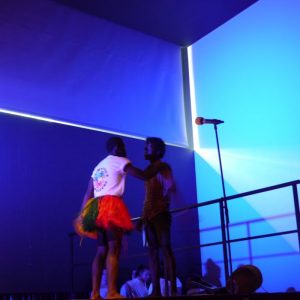
Then after 10 years KWAFE people started experiencing the climate change effects like hunger, droughts and many more others. Thus they were starting to fight and thinking about the roots of the problems. Finally, they got to know that it was because of the climate change effects and that they were the ones who caused that. Thus they started to find methods to reduce and combat the climate change problems: planting more trees, use less car in travel, manage proper waste management and many more factors.
At the end of the show, they all sang together the famous song “WE ARE THE WORLD”: the song emphasises that everyone takes action and does not forget that anything one does may cause effects to the world. Weeks before, the students prepared posters concerning their views on climate change.
During the song they showed these posters to the audience and each one read them out loud during the performance.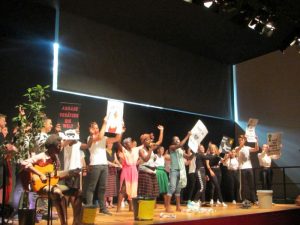
After the end of the program the SOSOLYA UNDUGU DANCE ACAMEDY together with students of 10B class and their teachers planted an apple tree in the school garden for the memory of the climate-justice program under the direction of the Kinderkulturkarawane. Special thanks to SUDA, the teachers and students from Bergedorf ,and everyone who participated to make sure the project was successfully done.


